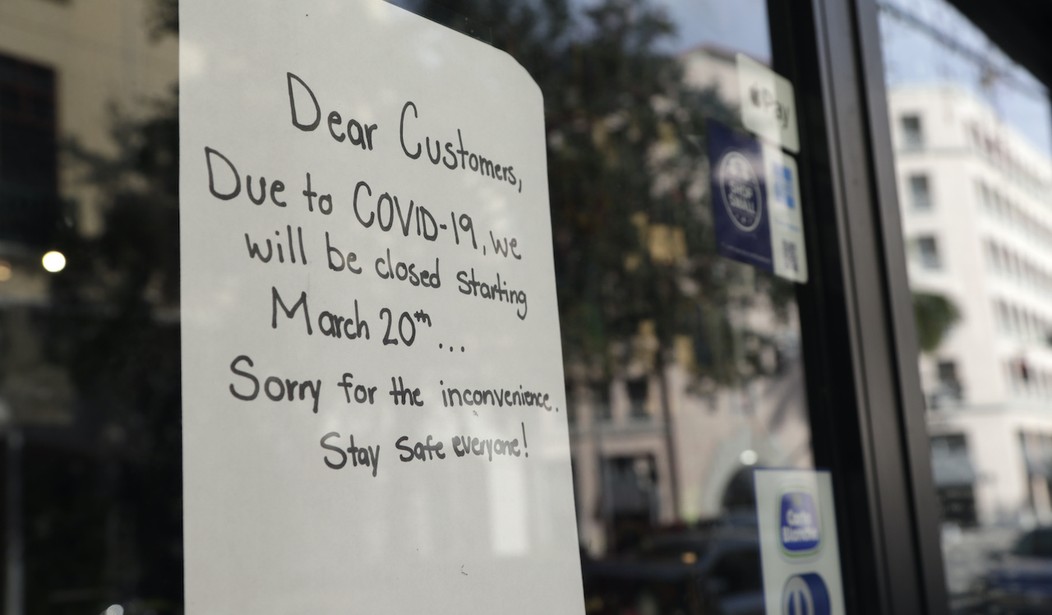Despite the way Big Media has incessantly phrased it – the China Virus hasn’t shut down a single US business for a single day.
Governments – in the name of China Virus – have shut down almost all businesses almost everywhere.
In the process, they murdered a perfectly good $22 trillion economy.
In the process, they murdered tens (hundreds?) of thousands of small businesses.
You know who LOVES the shutdown? Big Business.
Big businesses are watching tens (hundreds?) of thousands of their competitors either die – or be crippled beyond recovery…to be later purchased and subsumed by Big Business.
More than two months of government shutdown ago – this was a headline:
Jeff Bezos’s Net Worth Has Increased by $24 Billion During the Covid-19 Pandemic
Bezos, of course, owns Amazon. The monster online retailer that sells…everything.
Bezos LOVES watching the government murder tens (hundreds?) of thousands of his competitors. As his massively expanding bank account attests.
The more government sits upon the economy – the greater the number of businesses that get squashed.
The Big Business Amazons can withstand the strain. The Mom & Pop Shoppes can not.
Government is – always and everywhere – an impediment to greater private sector competition.
Which of course means government is – always and everywhere – an impediment to greater private sector growth.
Because as we just witnessed with the China Virus shutdown – more competitors can only exist in a healthy economy. Because there’s more money for which to compete.
Which means less government is a necessity.
To wit:
If you want more competitors competing to connect the Internet to people not currently connected – get the government the heck out of the way.
Behold an essay written by current Federal Communications Commission (FCC) Commissioner Michael O’Reilly.
Removing Unnecessary Barriers and Maximizing Competition in USF Auctions:
“In striving to bring broadband access to all unserved Americans within existing funding constraints, the FCC must stretch scarce Universal Service Fund (USF) dollars as far as possible….
“(C)ompetition, on both an intra- and inter-area basis, helps drive down the funding amount needed to entice the private sector to build out broadband to areas that wouldn’t be served….
“In implementing our reverse auctions, we should always aim to maximize participation and, in turn, competition, rather than arbitrarily limit the number of auction competitors.
“One way to do this is to eliminate the condition that auction winners be designated eligible telecommunications carriers (ETCs).”
So – government is looking to spend government money to connect the unconnected. That’s the USF program (check your phone bills for USF taxes…and despair).
The government “reverse auctions” the USF jobs to connect the unconnected.
And the government artificially, severely limits the number of bidders – with its ridiculous ETC designation:
“Over the years, it has become clear to me that certain providers have been discouraged from competing for USF support to serve high cost areas due to the ETC requirement….
“While requiring ETC status doesn’t bar participation by certain providers on its face, it serves as a major obstacle for many companies in practice.
“Getting the designation itself can be a time-consuming and resource-intensive process, especially depending on the state jurisdiction in question. However, that pales in comparison to the added regulatory burdens and litigation risks that come with being subject to state telecom regulation.
“Individual states have specific requirements for incumbent and competitive local exchange carriers, including ETCs, covering everything from billing to service level reporting, installation, late fees, accounting standards, and customer complaint processes, which add complexity for companies that operate in multiple states or nationwide and may even conflict with providers’ existing local regulatory requirements for other services in multi-product bundles.
“And, the designation often introduces new burdens: take, for example, state-specific Lifeline requirements and certain states’ disconnection rules that require ETCs to continue providing basic voice service to a customer despite a lengthy period of non-payment.
“In other words, a nationwide provider with streamlined practices would potentially become subject to a patchwork of regulations—in certain cases, upwards of 40 different regulatory regimes—even though many of the rules entirely pre-date the modern broadband networks that our auctions are trying to subsidize, often, by several decades.
“Even more significant in driving potential bidders away, becoming an ETC can involve tremendous uncertainty and unforeseen burdens. Certain state commissions have been overzealous in expanding their regulatory reach, for example, by proposing onerous, unreasonable rules requiring carriers to report on network outages far in excess of the FCC’s existing reporting system and in a manner likely to undermine confidential consumer data.
“Elsewhere, there have been attempts to mandate specific backup power requirements that would be technologically, logistically, and economically infeasible to comply with, create serious fire and safety risks, and wouldn’t even help maintain service for the vast majority of consumers.
“Further, several state PUCs have improperly attempted to regulate interstate VoIP services outside of their jurisdiction, which some providers—and the FCC itself—have successfully fought.”
Did you get all that government-imposition insanity?
Becoming a government-approved ETC – is for companies a giant pain in the posterior.
Before, during and after receiving the designation. In ways both known – and unknown.
And as with the China Virus shutdown, it is smaller companies that can least afford to deal with the government’s many ETC inanities.
So less companies seek the ETC designation.
Which means less companies are bidding to connect the unconnected to the Internet.
Which means fewer unconnected people become connected.
So let us bag the ETC, shall we?
And let thousands of competitor flowers bloom.












Join the conversation as a VIP Member